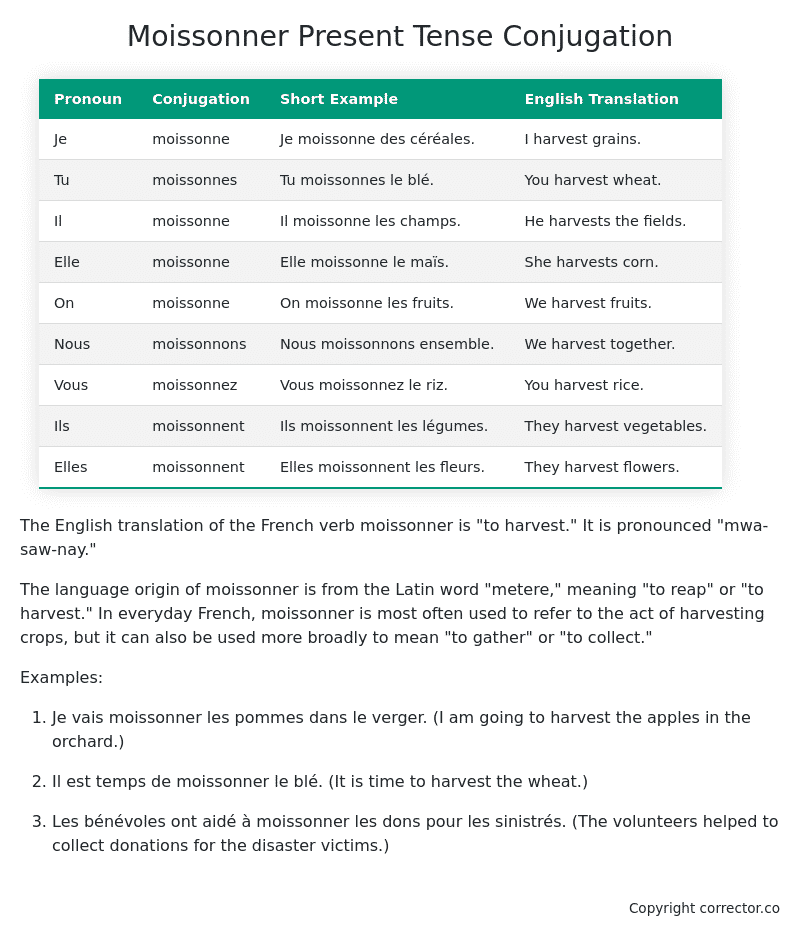Le Present (Present Tense) Conjugation of the French Verb moissonner
Introduction to the verb moissonner
The English translation of the French verb moissonner is “to harvest.” It is pronounced “mwa-saw-nay.”
The language origin of moissonner is from the Latin word “metere,” meaning “to reap” or “to harvest.” In everyday French, moissonner is most often used to refer to the act of harvesting crops, but it can also be used more broadly to mean “to gather” or “to collect.”
Examples:
-
Je vais moissonner les pommes dans le verger. (I am going to harvest the apples in the orchard.)
-
Il est temps de moissonner le blé. (It is time to harvest the wheat.)
-
Les bénévoles ont aidé à moissonner les dons pour les sinistrés. (The volunteers helped to collect donations for the disaster victims.)
Moissonner – About the French Present Tense
To take a deep dive into all the French tenses then see our article on Mastering French Tense Conjugation.
Common Everyday Usage Patterns For Le Present
Interactions with Other Tenses
Table of the Present Tense Conjugation of moissonner
| Pronoun | Conjugation | Short Example | English Translation |
|---|---|---|---|
| Je | moissonne | Je moissonne des céréales. | I harvest grains. |
| Tu | moissonnes | Tu moissonnes le blé. | You harvest wheat. |
| Il | moissonne | Il moissonne les champs. | He harvests the fields. |
| Elle | moissonne | Elle moissonne le maïs. | She harvests corn. |
| On | moissonne | On moissonne les fruits. | We harvest fruits. |
| Nous | moissonnons | Nous moissonnons ensemble. | We harvest together. |
| Vous | moissonnez | Vous moissonnez le riz. | You harvest rice. |
| Ils | moissonnent | Ils moissonnent les légumes. | They harvest vegetables. |
| Elles | moissonnent | Elles moissonnent les fleurs. | They harvest flowers. |
Other Conjugations for Moissonner.
Le Present (Present Tense) Conjugation of the French Verb moissonner (this article)
Imparfait (Imperfect) Tense Conjugation of the French Verb moissonner
Passé Simple (Simple Past) Tense Conjugation of the French Verb moissonner
Passé Composé (Present Perfect) Tense Conjugation of the French Verb moissonner
Futur Simple (Simple Future) Tense Conjugation of the French Verb moissonner
Futur Proche (Near Future) Tense Conjugation of the French Verb moissonner
Plus-que-parfait (Pluperfect) Tense Conjugation of the French Verb moissonner
Passé Antérieur (Past Anterior) Tense Conjugation of the French Verb moissonner
Futur Antérieur (Future Anterior) Tense Conjugation of the French Verb moissonner
Subjonctif Présent (Subjunctive Present) Tense Conjugation of the French Verb moissonner
Subjonctif Passé (Subjunctive Past) Tense Conjugation of the French Verb moissonner
Subjonctif Imparfait (Subjunctive Imperfect) Tense Conjugation of the French Verb moissonner
Subjonctif Plus-que-parfait (Subjunctive Pluperfect) Tense Conjugation of the French Verb moissonner
Conditionnel Présent (Conditional Present) Tense Conjugation of the French Verb moissonner
Conditionnel Passé (Conditional Past) Tense Conjugation of the French Verb moissonner
L’impératif Présent (Imperative Present) Tense Conjugation of the French Verb moissonner
L’infinitif Présent (Infinitive Present) Tense Conjugation of the French Verb moissonner
Struggling with French verbs or the language in general? Why not use our free French Grammar Checker – no registration required!
Get a FREE Download Study Sheet of this Conjugation 🔥
Simply right click the image below, click “save image” and get your free reference for the moissonner Present Tense tense conjugation!

I hope you enjoyed this article on the verb moissonner. Still in a learning mood? Check out another TOTALLY random French verb present conjugation!


